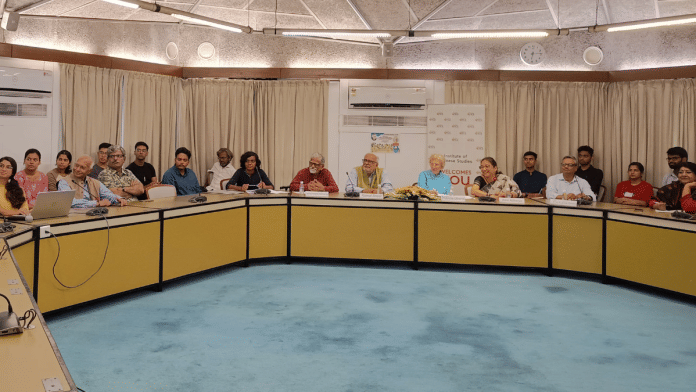New Delhi: India has been at the forefront of Chinese worldview since ancient times, said scholar Professor Kamal Sheel at the 16th Giri Deshingkar Memorial Lecture organised by the Institute of Chinese Studies in New Delhi.
Sheel was speaking on “India in the Chinese Quest for Nationalism and Modernity: Perspectives from Chinese Travel Writings”.
His presentation was based on two modern Chinese travelogues on India by Huang Maocai and Kang Youwei. These travelogues have been translated by him along with Professor Ranjana Sheel.
Sheel said that travel narratives, often written keeping in mind the reader of the writer’s own country, were influenced by their own setting and culture. He added these narratives mapped out territories in miles, defined contours of nations and communities and determined forms of cultural and political representation.
While China and India shared a civilisational bonhomie, the shift from civilisational state to the nation state began at the turn of the 19th and beginning of the 20th Century, he said.
He mentioned it was the travel narratives of Chinese Buddhist monks such as Faxian, Xuan Zang and Yijing, that confirmed dynamic intellectual exchanges.
Sheel added that Chinese intellectual officials and activists studied India to comprehend its nature and development as a cultural and colonial state, and for lessons to be learnt from the country. “Somehow, they travelled to India and presented their views in travel narratives that they wrote for their audience back in China.”
Sheel said these texts provided a “valuable prism” to gauge the early 20th century Chinese modernisers’ mind as they navigated the challenges and the uncertainty of those times with India as a highlight.
Speaking about Huang Maocai, Sheel said he was the first Chinese moderniser and intellectual traveller to India and was a trained cartographer working with the imperial Qing state, adding that Maocai also knew languages and modern sciences. “He was a supporter of the modern knowledge system, especially sciences, he valued west-inspired ideas of nationalism and modernity.”
In the British era, Maocai was deputed by the Qing state to ascertain the situation of China-Tibet-India land route and the geopolitical motives of British India, Sheel said.
He added the impetus for this was the Sino-British treaty of 1876 that extended British trade and travel rights to interior China.
“This led to real apprehensions in China about the security and sovereignty of their territory with increased movement of foreigners in their southwest frontier region at the peak of the Great Game between Britain and Russia,” Sheel said. Huang’s task was to map the world and the autonomous southwestern frontier of the empire and safeguard the actual or imagined national territory.
In the two years of his travels, Maocai passed through Sichuan, Tibet, Yunnan, Myanmar by overland route and took a ship from Yangon to reach Kolkata, from where he returned to Guangzhou by sea, Sheel added.
Kang Youwei’s travelogue
The second substantive Chinese travelogue of that era was by Kang Youwei. Kang was a “maverick intellectual” and among the first modernisers of 19th Century China, who stood against mimicking the western idea of nationalism and modernity, Sheel said.
According to him, Youwei travelled the world to gather information in order to formulate a Chinese idea of nationalism and modernity in the 1901-1902 travelogue “Yindu Youji (Record of Travel to India)”. It included observations on history, politics, society, religion, art and architecture.
Changing political maps of the nation state in 19th Century Europe were uncomforting to his idea of unity, peace and harmony as he was against west-inspired modernity and nationalism, Sheel said. “Colonial India disturbed him. Kang thought that China must draw lessons from the Indian experience and redefine the idea of nationalism and modernity.”
For both Huang and Kang, the common point of interest was Buddhism in India. “India as a mother country for Buddhism which became a major part of Chinese knowledge and cultural system along with Confucianism and Taoism commanded respect and awe,” Sheel said.
He added the Chinese believed India paralleled China as a strong civilisational state and Buddhism cemented their ties. “It was natural that both Huang and Kang had Buddhism in mind when they travelled to India for designing the Chinese nation and modernity. Yet, during their travel, they encountered not a Buddhist but the other India which they mapped and discussed. Both, however, lamented the withering of Buddhism that they had identified India with.”
ThePrint was a media partner for this event.
(Edited by Tikli Basu)
Also read: ‘Greater China’ is rooted in maximalist boundaries. ‘Akhand Bharat’ is based on shared history






